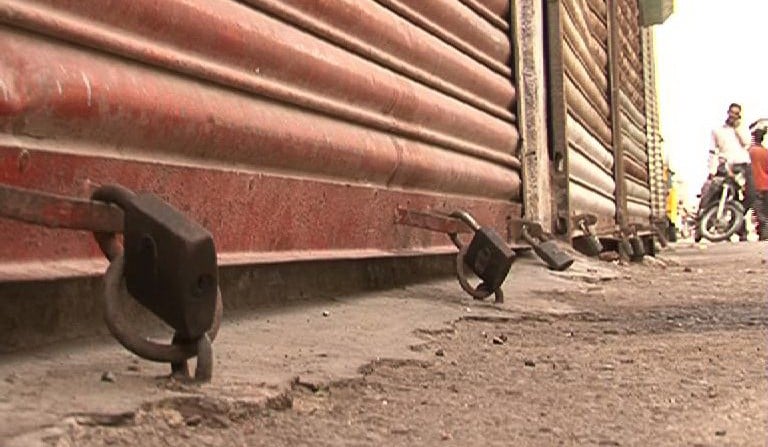

"I often skip one meal a day to save money to send to my family in Bajaur," says labourer Mir Zaman, while looking at a restaurant menu where Koila Karhai costs Rs.900 per kilogramme.
At around 1:45pm, at the Fresco Chowk, near the Burns Road food street in Karachi, 47-year-old Zaman, who hails from the Bajaur Agency in Fata, was among the 15 or so labourers waiting to get a day’s work. In Karachi, he lives in a dera at Pakistan Chowk, I.I. Chundrigar Road, with fellow Pushtun labourers. "Sometimes, it’s difficult to get work for days, and in case of a strike in the city, my work cycle gets jammed," he says.
Zaman’s is not a lone voice. The frequent strike calls by political and religious parties are frustrating some 20 million people of Karachi. "Every shutdown in the city incurs a loss of at least Rs.2.5 billion to national exchequer," says Iftikhar Vohra, President Karachi Chamber of Commerce and Industries (KCCI).
"What is our sin?" asks Atiq Mir, Chairman of All Karachi Traders Alliance. Strikes called by the two major political parties in Karachi are devastating businesses. Shop owners are laying-off salesmen due to the shrinking economic activity, thus increasing the number of unemployed people living in the country’s metropolis. "In some extortion cases, it was unearthed that salesmen were directly or indirectly involved because they are facing monetary problems."
Most representatives of business fraternity believe that lack of law and order and frequent strikes are discouraging investment -- factory owners are more cautious about production while shopkeepers are uncertain about inventories. They say flourishing business entails opening prosperous avenues, ranging from increasing foreign reserves to generating employment.
Khalid Khan, President Goods Carrier Association, says, "80 per cent heavy transport operators and drivers park their vehicles during lockdowns due to fear of destruction. During strikes, only Port Qasim functions because it is far from the city centre".
Likewise, 50 per cent people avoid travelling upcountry on buses on strike days. A day before the strike, petrol pumps and shopping centres are closed either due to threats or aerial firing.
Karachi Customs Agent Association estimates on average 2,350 import delivery containers reach three different port terminals of Karachi -- Karachi International Container Terminal (KICT), Qasim International Container Terminal (QICT) and Pakistan International Container Terminal (PICT). "When there is a strike, goods transporters refuse to load the containers. The authorities charge Rs.2,400 to Rs.4,400 demurrage [fine imposed on importer for his extra use of port vicinity] and container rent," says Khurram Ijaz, General Secretary Karachi Customs Agent Association.
Also, 1,500 containers carrying export delivery goods arrive regularly on three container terminals. "On the days of lockdown, exporters do not dispatch their consignment from factories for security concerns. Due to such delays, the exporters fail to meet deadlines of international buyers because vessels have to sail according to their schedule," says Ijaz.
Atiq Mir of All Karachi Traders Alliance discloses that fear factor is compelling many traders to close their businesses -- "Certain traders receive phone calls and messages to support the strike".
Mir Afzal, President Sindh Bus Owner Association, says, "Various outfits urge us to issue press statements in favour of the lockdown".
According to statistics collected by the Private Schools Management Association, out of 365 days in a year, schoolchildren go to school for 170 days. Strikes and other emergency calls bring the number of school days further down. Khalid Shah, Chairman Private Schools Management Association says, "Children consider announcement of school closure as a happy moment. The are oblivious of the fact that their city is on fire."
The Private Schools Management Association has never received phone calls from any quarter pressing for school closures. Khalid Shah says, "On days of strike, we rely on the report of our 18 coordinators" and when a lockdown is announced, "we usually close the schools -- because parents avoid sending their children and van drivers refuse to pick and drop children to school due to apprehensions."
The University of Karachi and its affiliated institutions regularly announce the cancellation of examinations on the days of strike.
Of late, political and religious parties have started to call off strikes by the afternoon, allowing people to kickstart their day. But, a majority of schools operate in the morning, so by the time the city gets normal, the school day is already wasted.
Also, "if a labourer arrives at work at 5pm, how will he, say, load a 40-feet container before the sun sets," says Khalid Khan.
On average, 10,000 vehicles come to Karachi from all over Pakistan for loading and unloading purposes everyday. On December 27, 2007 when Chairperson of Pakistan Peoples Party Benazir Bhutto was assassinated in Liaquat Bagh Rawalpindi, more than 1,500 trucks and trawlers carrying goods for Punjab and KP were destroyed. But only 10 per cent vehicles were compensated.
Similarly, more than 50,000 small and large commercial buses operate in Sindh. On the day of BB’s assassination, around 3,000 buses were damaged and the committee headed by former provincial secretary Transport, Rasheed Alam, settled only 978 compensation claims.
Mir Afzal, President of Sindh Bus Owners Association, says that they have written letters to PM, CM Sindh and other government officials, requesting that whenever a vehicle is set on fire, an FIR should be registered against the party head, and he should compensate for the loss.
Responding to a question on the provision of security during protest calls, Atiq Mir says, "The law enforcement agencies cannot provide security. We know their strength. Asking the Sindh government for protection is like asking a dead body…"
Khalid Khan adds, "Only a matchstick and fuel is needed to set a person’s lifetime earning ablaze. Police never arrest a culprit".